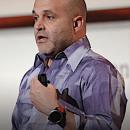Steven Pousty
Helping you understand and implement technology
Steve is a dad, partner, son, and founder of Tech Raven Consulting. He can teach you about Data Analysis, Java, Python, PostgreSQL, Microservices, Containers, Kubernetes, and some JavaScript. He has deep subject area expertise in GIS/Spatial, Statistics, and Ecology. Before founding his company, Steve was a developer Advocate for VMware, Crunchy Data, DigitalGlobe, Red Hat, LinkedIn, deCarta, and ESRI. Steve has a Ph.D. in Ecology and can easily be bribed with offers of bird watching or fly fishing.
Presentations
This workshop prepares web and application developers to build applications with Docker, Kubernetes, and OpenShift. We’ll start with a short introduction to Platform-as-a-Service, Docker, and Kubernetes, which are some of the foundational pieces of OpenShift.
Using hands-on exercises, I will walk you through several use cases for using Docker containers to deploy simple, complicated, stateful, stateless, and microservice applications. You will bring your laptop and I will bring a working platform in a VM and we will spend most of the time getting stuff done.
This workshop prepares web and application developers to build applications using Containers, Kubernetes, and OpenShift. We’ll start with a short introduction to containers and Kubernetes, which are the foundation of OpenShift.
Using hands-on exercises, we will walk you through tasty menu of applications and uses cases for OpenShift. How about showing you how easy it can be to deploy your pre-built containers? Maybe showing how health checks so OpenShift can heal your application. Let’s dig in to build containers by just giving a git repository. Want to see easy application scaling - no problem! Wish you could do A/B deployment - your wish is our command. Finally we will show you a complete microservice application with DB and polyglot backed services.
You bring your curiosity and willingness to code and we will teach all you need to go home and start building pure awesomeness on OpenShift.
For most of my lifetime in the computing world, data crunching and web serving were two very separate worlds. If a web app wanted access to the analysis there was a long process of ETL, DB work, imports and exports, and bribing various network and storage people for the resources you needed. With the rise of containers, orchestration, cheap computing and networking, and over 10 years of people tackling large problems at new scales we have finally come to a convergence.
It is now possible for us to actually use the same hardware, and more importantly, clustering software to converge both types of workloads. We are going to lay out a high level vision of how this can look with Containers, Kubernetes, web servers, and Apache Spark. This can be considered a germ of what we can look to build in the future. We will demo this in action and show this is actually now achievable for mere mortals such as us. This convergence allows data analysis move from custom R or Python scripts on an analyst’s desktop to a front-line accessible web app. At the same time, the analyst can “constrain” the analysis to prevent “statistical overreach”.
For us developers, there has been a lot of change in the infrastructure where our apps will run. New to the mix is running in containers in some type of cloud enabled environment. After some basic concepts around containers and running them in production we go full on ALL DEMO, ALL THE TIME! I am going to show how to accomplish your local fast iteration development but now seamlessly deploy that to a frickin’ awesome run time platform a container platform based off of Kubernetes.
Come and see how the future of development is evolving!
We in the tech industry like to borrow analogies from the ecological field - ecosystems being one example. In this talk I will bring some new concepts to your attention (I have a PhD in Ecology) and show how they can make your technology life better.
The two main ideas I will address are: 1) Software is eating the world - Marc Andreesson 2) If your not first, your last - Ricky Bobby
These are two persistent ideas in our field that I think has done us harm both as an industry and as individuals. This talk will share some of the history that has led to this point, and offer insights on how new systems and new thinking can help you shape your own ops and developer evolution from traditional data center virtualization to hybrid cloud models, microservices architectures and beyond. I will also be talking about a new way for us to think about what “best architecture” or “best solution” means.
You have started to hear about microservices and you want to learn more about what happens when the rubber meets the road. In this talk I will cover the process I went through in constructing http://wwww.flatfluffy.com, a multi-device application for gamified recording of roadkill.
While I will briefly cover how I went about the process, I will pay particular attention to how to get started, understanding what microservices ACTUALLY needs, and how you too can be
a microservices practitioner. My talk style is informal and interactive so there will be a back and forth to discuss some of your implementation questions. Come in curious, leave with some solid ideas on how to get started on your first microservice architected application.
You went ahead a built a whole new set of shiny microservices. While doing this you realize you can no longer rely on you Application Server to handle all the authentication. Oh, and of course one of your teams used Node.JS How are you going to secure all these endpoints so that the
end user doesn't have to authenticate against each one.
This talk will be a demonstration of using a centralized authentication service to secure many different microservice architecture. The demos will Project Keycloak but would apply just as well with Stormpath, Ping.Indenty, or
similar services.
